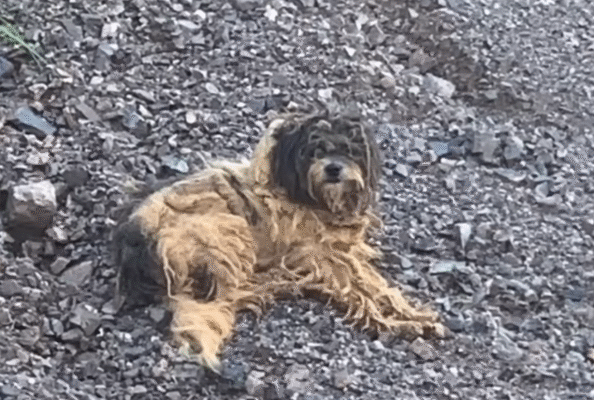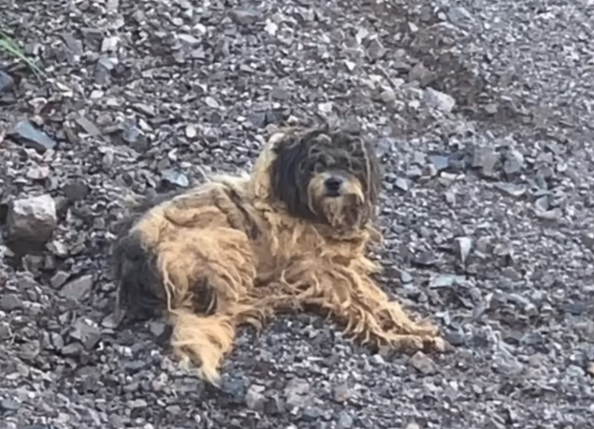
The mountain was silent except for the whisper of the wind brushing through dry grass and the soft crunch of paws on gravel. A thin, ragged dog stumbled along a narrow trail, his fur matted, tangled, and covered in dirt. His ribs pressed against his sides, each breath shallow and labored. The air was cold, and hunger gnawed at his stomach like a constant ache.
He had no name anymore—if he ever did, he couldn’t remember it. The world had reduced to a simple, endless search: food, water, shelter. Survival.
The mountains had once been a place of beauty. Tall pines reached toward the sky, streams ran clear, and the valleys below were full of life. But for the stray dog, it was a lonely wilderness. He had wandered there after being abandoned at a roadside weeks ago. His family had driven him into the hills, opened the car door, and left him behind. He chased the car until his legs gave out, barking desperately, believing they would stop. They never did.
Now, the only sound that greeted him was the rustle of the trees and the occasional distant cry of an eagle.
He wandered day and night, nose pressed to the ground, searching for scraps. Sometimes he found small bits of food near old campsites—half-eaten bread, a bone left behind by hikers—but most days he found nothing. His once-soft fur was now caked with mud and burrs. When it rained, he shivered beneath fallen logs or hid in shallow caves, curling into a ball to stay warm.
One morning, he limped to the edge of a stream, his paws sore and bleeding from the rocky terrain. He bent down to drink, his reflection rippling in the cold water. The dog staring back was a shadow of who he once was—thin, broken, and lost. Still, there was a spark in his eyes, faint but alive: the will to keep going.
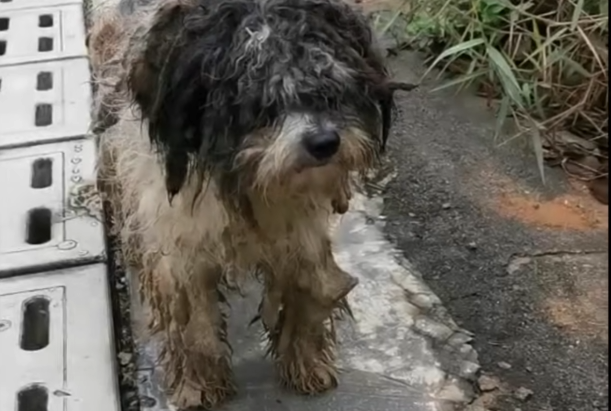
Days passed, and the dog’s strength faded. The nights grew colder, and snow began to fall. He trudged through the white drifts, his fur soaked, his body trembling. He hadn’t eaten in days. He followed the scent of smoke, hoping it meant people—maybe food, maybe warmth.
Finally, he saw it: a small cabin nestled among the trees, smoke rising from the chimney. His tail wagged weakly as he approached. The smell of meat cooking filled the air, and he whimpered softly, too tired to bark.
Inside the cabin, a man named Jack sat by the fire, stirring a pot of soup. He had moved to the mountain years ago after losing his wife, seeking peace in solitude. He rarely saw anyone up there, and certainly not a dog. When he heard a faint scratching at the door, he frowned, setting his spoon aside.
Opening the door, he froze. There, standing in the falling snow, was the dog—so thin he looked like a ghost. His eyes, tired but pleading, met Jack’s. For a long moment, neither moved. Then the dog took one shaky step forward and collapsed onto the porch.
“Oh, you poor thing,” Jack murmured, kneeling beside him. Carefully, he lifted the limp body and carried him inside, wrapping him in an old blanket. The dog’s body was ice-cold, his breathing shallow. Jack rubbed him gently, trying to warm him. “You’re safe now, buddy. I’ve got you.”
He gave the dog a small bowl of water and bits of soft food, which the animal devoured eagerly despite his weakness. After eating, the dog lay down beside the fire, sighing deeply. Jack could see every bone beneath his fur, every scar that told a story of hardship.
Over the next few days, Jack nursed the dog back to health. He cleaned his fur, removed the burrs, and treated his wounds. Slowly, color returned to the dog’s eyes, and he began to wag his tail when Jack spoke.
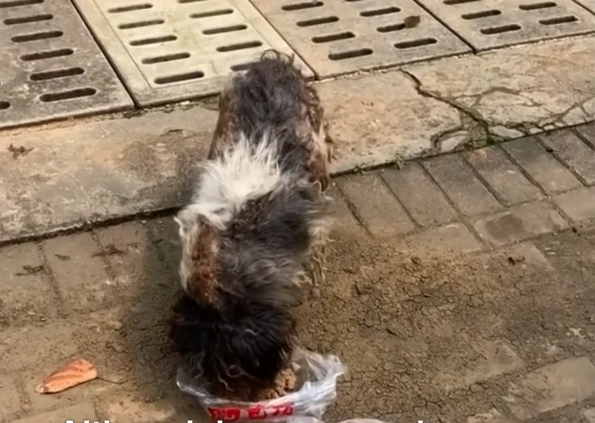
“You need a name,” Jack said one morning while pouring kibble into a bowl. “How about… Shadow? You followed the mountain’s shadows long enough, didn’t you?”
The dog’s ears perked up at the sound of his new name, and Jack smiled. “Shadow it is.”
From that day forward, Shadow was no longer alone. He followed Jack everywhere—through the woods, by the river, even up the steep trails when Jack went to collect firewood. Though his body still carried the marks of neglect, his spirit began to heal. Every wag of his tail, every playful bark, was a step away from the loneliness that had once consumed him.
One evening, a blizzard swept across the mountain. The wind howled, and snow piled up against the cabin walls. Inside, Jack and Shadow sat by the fire, safe and warm. Jack stroked Shadow’s fur, now clean and soft, and whispered, “You were out there in this kind of cold all alone, weren’t you? You must’ve been so scared.”
Shadow lifted his head and pressed it against Jack’s chest, as if to say, Not anymore.
Days turned into weeks, and soon, Shadow became a different dog. He grew stronger, faster, happier. He learned to fetch sticks, chase squirrels, and splash in the stream near the cabin. But he never strayed far from Jack’s side. He had found what he had been searching for all along—not just food or shelter, but love.
Whenever hikers passed through the mountain trails, they sometimes caught glimpses of the pair: an old man and his golden-furred companion walking side by side. Shadow always stayed alert, watching for danger, loyal to the one who had saved him.
Then one spring afternoon, something remarkable happened. Jack heard barking near the edge of the forest—loud, urgent barking. He ran outside and saw Shadow circling a small figure—a young girl who had fallen off the trail while hiking with her family. She was crying, her ankle twisted.
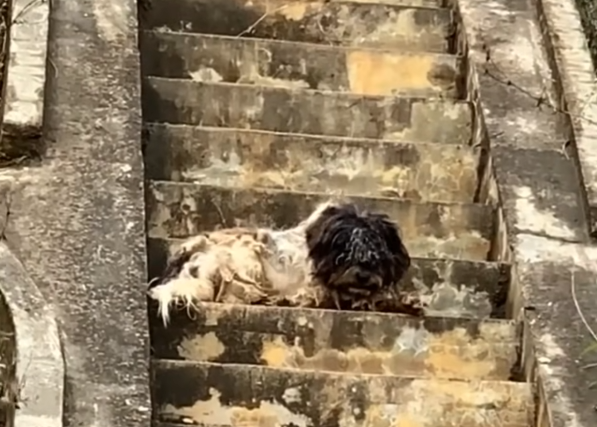
Jack called emergency services, and while they waited, Shadow stayed with the girl, licking her hands, keeping her calm and warm. When rescuers arrived, they couldn’t stop praising the brave dog. “He probably saved her life,” one of them said. Jack just smiled. “That’s Shadow for you. He knows what it’s like to be lost.”
After that day, Shadow became known as the “Mountain Guardian.” Hikers often left treats and food near the trail in his honor, not knowing the full story of the starving dog who once wandered those same paths, searching for hope.
Years later, when Shadow had grown older and his muzzle turned gray, he would often sit at the cabin’s porch, gazing out at the mountains. The same mountains that had once been cruel and cold were now peaceful, safe, and full of life. He would close his eyes, listening to the wind rustle through the pines, feeling Jack’s hand gently resting on his back.
He was no longer lost. He had found his place, his family, his home.
The mountains that had once been his prison had become his kingdom—and the man who had found him had become his heart.
And so, the dog whose fur was once matted and covered in dirt, who had wandered the mountain alone in search of food and shelter, lived the rest of his days surrounded by warmth, love, and the gentle voice that always called his name:
“Come here, Shadow… time to go home.”
